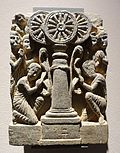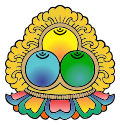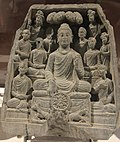Three Jewels
The Three Jewels, also called the Three Treasures, the Three Refuges, or the Triple Gem, are the three things that Buddhists give themselves to, and in return look toward for guidance, in the process known as taking refuge.
|
| |
|---|---|
|
Basic terms | |
|
| |
|
People | |
|
Schools | |
|
Practices | |
The Three Jewels are:
- Buddha, which means The Enlightened or Awakened One, who, depending on one's interpretation, can mean the Historical Buddha, Shakyamuni, or the Buddha nature or ideal within all beings;
- Dharma, which means The Teaching, which is the Teachings of the Buddha.
- Sangha, which means The Community, The Community of those great people who have attained Enlightenment, so that those people (Sangha) will help you to attain Enlightenment.[1]
Three Jewels Media
Veneration of the Three Jewels, Chorasan, Gandhara, 2nd century AD, schist – Ethnological Museum of Berlin
A Tibetan style Triratna (triple jewel) symbol
Shakyamuni Buddha and his followers, holding begging bowls, receive offerings. In the Pāli Canon, the Buddhist monk is given a significant role in promoting and upholding faith among laypeople.[2][3]
Gautama Buddha delivering his first sermon in the deer park at Sarnath, Varanasi with his right hand turning the Dharmachakra, resting on the Triratna symbol flanked on either side by a deer. Statue on display at the Chhatrapati Shivaji Maharaj Vastu Sangrahalaya in Mumbai.
Triratna symbol consisting of Trisula, Vajra, and Dharmacakra.
Triratna on a Taxila coin, 185–168 BCE (detail)
The compound Buddhist symbols: Shrivatsa within a triratana, over a Dharmacakra wheel, on the Torana gate at Sanchi. 1st century BCE
The Triratna or "Three Jewels" symbol, on a Buddha footprint (bottom symbol, the top symbol being a dharmachakra). 1st century CE, Gandhara.
References
- ↑ Hanh, Thich Nhat (1991). Old Path White Clouds: walking in the footsteps of the Buddha. Parallax Press. pp. 157–161. ISBN 0-938077-26-0.
- ↑ Wijayaratna 1990.
- ↑ Buswell & Lopez 2013, Kuladūșaka.






